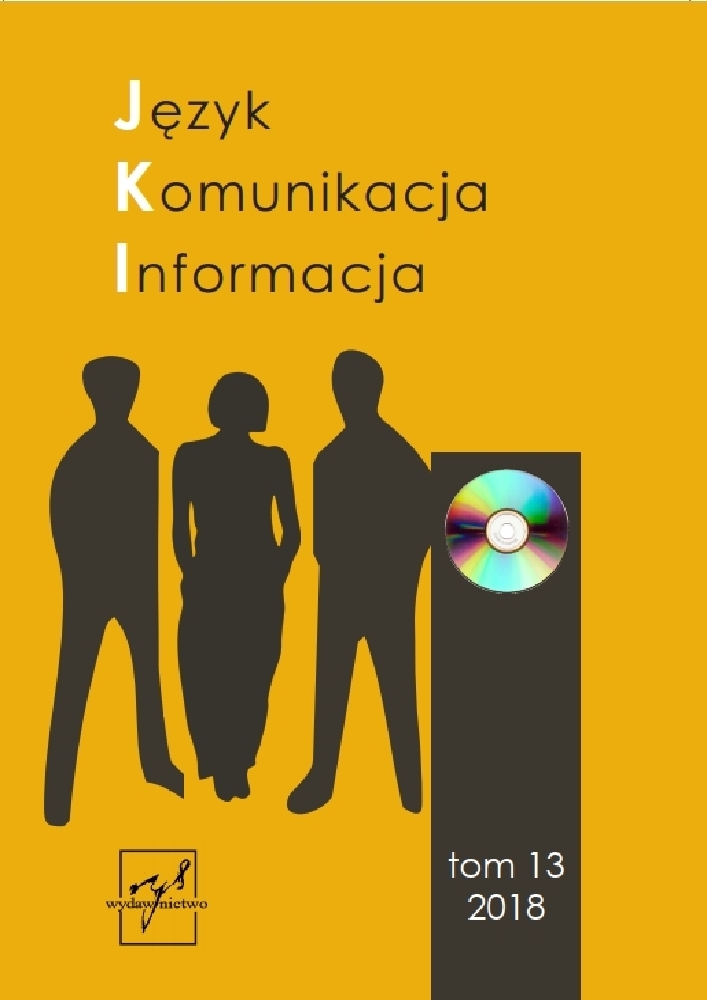Abstrakt
Forms of address are directly related to the nature of social relationships. The gender of the discourse partners, including the question whether they are of the same or different genders, thus has an impact on the use of forms of address. The goal of this paper is to highlight the major gender-related characteristics of Hungarian address practices by reporting on a comprehensive sociolinguistic study based on questionnaires and interviews. In line with the perspective of social constructivism, the gender-related usage patterns of address forms are interpreted as actively shaping the construal of particular relationships and gender roles rather than merely reflecting them. Thus, the research findings suggest that iterative patterns in the use of more confidential/affectionate forms with women contribute to the maintenance of female gender roles.
Bibliografia
Afful, Josepf B. A. 2007: Address forms and the constructions of multiple identities among university students in Ghana. Sociolinguistic Studies 1: 461–481.
Balázs, Géza 1999: A magyar nyelvművelés állapota. Tudománypolitikai áttekintés, javaslatok ‘The state of Hungarian language cultivation’. Magyar Nyelvőr 123: 9–16.
Bartha, Csilla & Hámori, Ágnes 2010: Stílus a szociolingvisztikában, stílus a diskurzusban ‘Style in sociolinguistics, style in discourse: Linguistic variability and the construction of social meaning in the “third wave” of sociolinguistics’. Magyar Nyelvőr 134: 298–321.
Bíró, Ferenc 1999: Névvel (is) nevel(het)ünk? ‘Do names contribute to education?’ In: V. Raisz, Rózsa & H. Varga, Gyula (eds): Nyelvi és kommunikációs kultúra az iskolában ‘Linguistic and communicative culture in education’. Budapest: Magyar Nyelvtudományi Társaság. 443–456.
Braun, Friderike 1998: Terms of Address. Problems of patterns and usages in various languages and cultures. Berlin: Mouton de Gruyter.
Brown, Roger & Ford, Margarite 1961: Address in American English. Journal of Abnormal and Social Psychology. 375–385.
Brown, Roger & Gilman, Albert 1960: The pronouns of power and solidarity. In: Thomas A. Sebeok (ed.): Style in Language. Cambridge: MIT Press. 253–276.
Butler, Judith 1990: Gender Trouble: Feminism and the Subversion of Identity. New York & London: Routledge.
Caffi, Claudia 1994: Metapragmatics. In: Asher, Ronald E. & Simpson, James M. Y. (eds): Encyclopedia of Language and Linguistics. Oxford: Pergamon Press.
Caffi, Claudia 2016: Revisiting Metapragmatics: ‘What Are We Talking About?’ In: Allan, Keith & Capone, Allesandro & Kecskes, Istvan (eds): Pragmemes and Theories of Language Use. Dordrecht: Springer.799–821.
Cameron, Deborah 1997: Performing gender identity: Young menʼs talk and the construction of heterosexual masculinity. In: Johnson, Sally & Meinhof, Ulrike Hanna (eds): Language and Masculinity. Malden, MA: Blackwell. 47–64.
Deme, László & Grétsy, László & Wacha, Imre 1999: Nyelvi illemtan ‘Linguistic etiquette’. Budapest: Szemimpex Kiadó.
Domonkosi, Ágnes 2002: Megszólítások és beszédpartnerre utaló elemek nyelvhasználatunkban ‘Address forms and elements referring to the discourse partner in Hungarian’. A DE Magyar Nyelvtudományi Intézetének Kiadványai. 79. szám. Debrecen.
Domonkosi, Ágnes 2010: Variability in Hungarian address forms. Acta Linguistica Hungarica 57: 29–52.
Domonkosi, Ágnes 2017: A nyelvi kapcsolattartás alapformái ‘The basic forms of linguistic interaction’. In: Tolcsvai Nagy, Gábor (ed.): A magyar nyelv jelen és jövője ‘The present and future of Hungarian’. Budapest: Gondolat Kiadó. 279–298.
Domonkosi, Ágnes & Kuna, Ágnes 2015: A tetszikelés szociokulturális értéke. A tetszikelő kapcsolattartás szerepe az orvos-beteg kommunikációban ‘The socio-cultural meaning of the Hungarian tetszik construction. The role of tetszik in doctor-patient communication’. Magyar Nyelvőr 139: 39–63.
Domonkosi, Ágnes & Kuna, Ágnes 2016: „Hanyadikra tetszik menni?” – A kor szerepe a tetszikelés használatában ‘The role of age in the use of the Hungarian tetszik construction’. In: Balázs, Géza & Veszelszki, Ágnes (eds): Generációk nyelve. Budapest: ELTE Mai Magyar Nyelvi Tanszék – Inter – Magyar Szemiotikai Társaság. 273–285.
Eckert, Penelope 2000: Linguistic variation as social practice. Oxford: Blackwell.
Eckert, Penelope & Mconnell-Ginet, Sally 1999: New generalizations and explanations in language and gender research. Language in Society. 28: 185–201.
Eckert, Penelope & McConnell-Ginet, Sally 2003: Language and Gender. Cambridge: Cambridge University Press.
Eckert, Penelope & Rickford, John 2001: Style and sociolinguistic variation. Malden, MA: Blackwell.
Friedrich, Paul 1972: Social context and semantic feature: The Russian pronominal usage. In: Gumperz, John & Hymes, Dell (eds): Directions is Sociolinguistics. New York, Holt: Rinehart and Winston. 270–300.
Hall, Kira & Bucholtz, Mary (eds) 1995: Gender articulated: Language and the socially constructed self. London & New York: Routledge.
Hopper, Robert & LeBaron, Curtis 1998: How gender creeps into talk. Research on Language and Social Interaction. 31: 1 59–74.
Huszár, Ágnes 2009: Bevezetés a gendernyelvészetbe. Miben különbözik és miben egyezik a férfiak és nők nyelvhasználata és kommunikációja? ‘Introduction to gender linguistics. Similarities and differences in the language use of men and women’. Budapest: Tinta Könyvkiadó.
J. Soltész, Katalin 1979: A tulajdonnév funkciója és jelentése ‘The function and meaning of proper names’. Budapest: Akadémiai Kiadó.
Molnár, Mária 2015: Megszólítási formák gender szempontú vizsgálata aszimmetrikus munkakapcsolatokban (Főnök-beosztott interakció) egy mezőgazdasági cég vállalati hierarchiájában ‘A gender-based study of address forms in asymmetric work relations in the hierarchical structure of an agricultural company’. Publicationes Universitatis Miskolcinensis. Sectio Philosophica 19: 256–276.
Norrby, Catrin & Wide, Camilla (eds) 2015: Address practice as social action: European perspectives. UK: Palgrave Macmillan.
Reményi, Andrea Ágnes 1994: Influences and Values: A Sociolinguistic Study in the Hungarian System of Address. Studies in Applied Linguistics 85–109.
Reményi, Andrea Ágnes 2000: Nyelvhasználat és hierarchia: munkahelyi csoportok megszólítási rendszerének diádikus elemzése ‘Language Use and Hierarchy: A Dyadic Study of the System of Address in Workpace Groups’. Szociológiai Szemle 10 (3): 41–59.
Takiff, Hilary A. & Sanche, Diane T. & Stewart, Tracie L. 2001: What’s in a name? The status implications of students’ terms of address for male and female professors. Psychology of Women Quarterly 25: 134–144.
Licencja
Polityka Open Access: Czasopismo zapewnia natychmiastowy, otwarty dostęp do wszystkich swoich treści zgodnie z zasadą, że badania swobodnie dostępne zwiększają i przyśpieszają globalny rozwój nauki i wymianę wiedzy.
Nadsyłając zgłoszenia, Autorzy zgadzają się na to, że artykuły w niniejszym czasopiśmie są publikowane w otwartym dostępie (Open Access) i podlegają licencji Creative Commons w wersji 4.0 BY-NC-ND.

